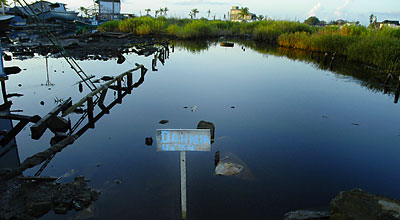RELOCATION EFFORTS RUN INTO SNAGS

A wooden sign stand where someone has staked a claim to land he
believes he owns.-Sng Li Wei
Untitled land
Under Jakarta's Aceh rehabilitation plan, key industries such as agriculture and fisheries will be restored to create jobs, while loans will be offered to encourage growth of small enterprises.
Reconstructed villages will house schools and mosques although the building of basic infrastructure such as roads and housing will be prioritised.
But on the ground, locals complained about the sluggish pace of recovery while officials said the rebuilding effort was still struggling with the arduous task of redistributing untitled land.
According to the World Bank, about 300,000 land parcels in Aceh were hit by the tsunami, of which less than 25 percent was titled before the disaster struck. Worse, most land documents were lost in the waves.
"Our people want to have houses quickly but the government is replacing titles very slowly," said T. Ahmad Dadek, an official in charge of 21 villages, or neighbourhoods, in Johor Palawan in Meulaboh.
As NGOs are not allowed to rebuild houses on untitled land, Dadek has resorted to issuing temporary land titles to speed up the reconstruction effort. Under the system, land ownership is signed into confirmation by the claimed owner, a fellow villager, the village head and Dadek himself.
When the killer waves struck, Aceh -- already plagued by a decades-old conflict between the Indonesian government and the Free Aceh Movement (GAM) rebels -- was the hardest-hit area among 13 Indian Ocean nations. Some 170,000 were left dead or missing in the province.
The U.N. has estimated that Jakarta would need at least two years to house the 500,000 Indonesians left homeless by the tsunami in either semi-permanent or permanent housing.
' * ' * ' * '
« prev